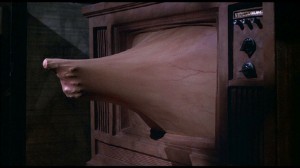 I started reading James Wood’s How Fiction Works while on a business trip to the unequivocally nice Orange County or The OC. The trip was less than pleasant for me personally because I apparently tore my rotator cuff earlier in the day while engaged in mildly excessive exercise activities. I say “apparently” because it took me a day or two to figure out what the source of pain really was, living through brief panic waves about what was happening to me while trying to avoid lifting my left arm in a manner that might give away the agony I was experiencing during business meetings.
I started reading James Wood’s How Fiction Works while on a business trip to the unequivocally nice Orange County or The OC. The trip was less than pleasant for me personally because I apparently tore my rotator cuff earlier in the day while engaged in mildly excessive exercise activities. I say “apparently” because it took me a day or two to figure out what the source of pain really was, living through brief panic waves about what was happening to me while trying to avoid lifting my left arm in a manner that might give away the agony I was experiencing during business meetings.
Note that this is the literary critic, James Wood, not the actor, James Woods; not the guy from Videodrome or any of the dozens of ecclectic roles the actor has been associated with.
James Wood, the critic then, is trying to operationalize the vast, categorical shaping of Roland Barthes or Milan Kundera in their efforts at criticism. Wood is not a pure theorist, but a careful reader who looks intimately at texts, unpacking the intent of the writer while defining the historical perspectives that informed the artistic effort. Looking intimately at Flaubert, Wood sees the flaneur of realism that began modernism and led, in turn, to post-modernism. Characters transform from our acquired fog of beloved personalities into flat extensions of English sensibilities in the Theophrastus of Jane Austen, or lurk behind the Russian tradition of estrangement that assigns extravagant and unlikely terminology to everyday things (Nabakov’s “leggy thing” in Pnin), and everywhere is the transition from description to internal dialog that drops the formality of specifying dialog at all. That is modernism. That is realism.
How does fiction work? By borrowing and overloading time, but imposing conflict on characters like layers of meringue until, as Adam Smith noted so many centuries ago:
As newness is the only merit in a Novel and curiosity the only motive which induces us to read them, the writers are necessitated to make use of this method [i.e., suspense] to keep it up.
By flattening out characters into idiosyncratic totems and caricatures. By imposing cants, lingos, and argots that cast an elaborate penumbra of specialized detail in the texts that requires the reader to presume authenticity sufficient for bourgeois buy-in. By soliloquies and the invention of highbrow cultural choruses that render scenes into a book of cultural semiotics filled with just slightly unpredictable tantrums by the heros and heroines.
It would be impossible to write a novel without human involvement and the artifice introduced by their perpetually intertwined souls. I’ve considered it: the life and times of ten square yards of hillside, riddled with insect and plant life, as detailed as Garcia-Marquez’s One Hundred Years of Solitude, but destitute of human wants and longings or expectations. It would be impossible by Wood’s fictional calculus because writing is always about people or the writer’s mind observing people.
And there would be no Deborah Harry.